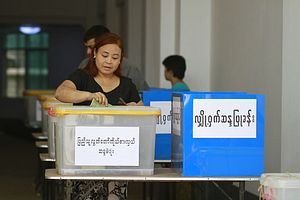On November 8, Myanmar will hold its first free national elections in twenty-five years. If the vote goes smoothly and the results are respected by all actors in the country, Myanmar could have its first democratically elected government since the early 1960s. Yet despite the excitement building over the election, and the vibrant campaigning going on across the country (itself a sign of the freedoms unleashed in Myanmar), the past few weeks have caused some Myanmar politicians and international observers to worry that this election will be fraudulent, and that a large proportion of voters will be denied the chance to call ballots. In one worrying sign, some early votes already have been cast by Myanmar citizens living overseas, though the advance voting process has been filled with apparent flaws, from a lack of paper ballots to incomplete voter rolls that could prevent some overseas Myanmar nationals from voting.)
Within Myanmar itself, the last weeks before Election Day have witnessed several disturbing trends. Much of Myanmar’s media market remains dominated by state-controlled newspapers and websites. In the weeks before the election, these publications have been running long articles touting the current Union Solidarity and Development Party (USDP) government’s achievements, and seemingly dropping any pretense of objectivity. Meanwhile, activists for the opposition National League for Democracy (NLD) have been assaulted on the campaign trail, most recently in an incident in the Irrawaddy Delta region. Radical Buddhist monks and their supporters, who have already allegedly played a central role in driving many Muslims out of western Myanmar and into internally displaced peoples’ camps, have traveled the country, trying to intimidate Muslims into not voting, and attempting to push candidates toward more hard-line anti-Muslim policies. Meanwhile, many of the voting rolls for people inside Myanmar seem as full of irregularities as those for Myanmar nationals living overseas, and in some conflict-torn areas, the lack of polling booths will make it very hard for most citizens to vote. In Kachin State, in the northeast, where the ethnic insurgency has not joined the nationwide ceasefire signed between the government and several insurgencies earlier this month, voting booths will be extremely scarce on the ground.
Do all of these trends add up to an unfair, potentially spoiled election? While the growing campaign-related violence, the slanted media coverage, and the questions about voter rolls certainly suggest this election could be fairer, the actual Election Day has the potential to go relatively smoothly, and to lead to a sizable opposition victory. In other words, Myanmar’s first free election in twenty-five years would ultimately be troubled but not unfree—a situation similar to elections held in other young democracies plagued by civil conflict, like Nigeria or Indonesia. The level of disturbances during the campaign period, while indicating that the military and the USDP have ambitions to retain a great deal of power, do not suggest that the military and/or the USDP will try to completely defraud voters on Election Day. The disturbances rather suggest that the USDP is trying to use all the advantages of incumbency, and decades of military rule, to best help the army’s favored party. The irregularities with voter registration and voter rolls are worrying, but these irregularities probably have not prevented enough Myanmar citizens from voting to seriously damage the NLD’s election prospects. The media landscape is tilted, but it was much more tilted the last time Myanmar held real national elections, in 1990, and the NLD and its allies still triumphed on that Election Day. Meanwhile, election observers from the European Union and other organizations are going to be allowed to travel throughout the country, observing polling sites.
Still, just because the actual Election Day will probably go relatively smoothly does not mean outside actors should abandon concerns about the electoral process. The United States, Japan, Norway, and other important actors in Myanmar need to continue emphasizing to Naypyidaw that a free election is crucial to further restoring military relations and to continued large-scale foreign investment in the country.
Joshua Kurlantzick is a fellow for Southeast Asia at the Council on Foreign Relations. This post appears courtesy of CFR.org.

































